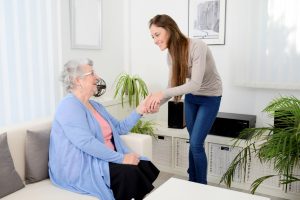
Activities to improve senior self-confidence are important as adults age.
“Here, let me help you with that.”
“Take it easy and don’t overdo it!”
“You just sit down and rest; I’ll take care of that.”
How many times have we made statements just like these to senior loved ones, with the very best of intentions, of course? We want to do whatever possible in an effort to help our older loved ones, to keep them safe and to take care of them in the same way they took care of us when we were young. Nonetheless, there is a concealed hazard in trying to do too much for older individuals and depriving them of the opportunity to do as much as they can on their own – the possibility of negatively impacting senior self-confidence and sense of meaning and purpose in life.
Take, for instance, an older gentleman who devoted his entire life to taking care of his family, and just recently has progressed into the initial phase of Alzheimer’s disease. Seeing that he has continually identified himself as a provider, being dependent on someone else to provide for him can be quite tough and even feel demeaning. It is crucial to help him preserve the sense of being needed by others, and there are a number of ways to accomplish just that. Try these guidelines from Advanced Home Health Care:
- Seek advice. Being provided with the occasion to share knowledge and wisdom is a great boost to an older person’s self-esteem, and there’s definitely a lot we can learn from seniors. Come up with little ways throughout the day to ask the older person’s guidance on how to make a perfect batch of biscuits, how to stop the draft coming in under the windowsill, how to soothe a cranky baby, etc.
- Ask for assistance. As in-home caregivers, it is our responsibility to support older adults with a variety of needs, but we also realize the value of allowing seniors the chance to perform helpful tasks too. It doesn’t have to be a monumental task to maintain the sense of being needed. Know the senior’s cognitive and physical restrictions, and request his/her help accordingly. For example, a senior who is in a wheelchair can sit at the table and assist with baking related tasks, polish silverware, or sort tools in a toolbox.
- Verbally show your respect. Although you might believe the person understands how you feel, it’s a great feeling to be told how much we mean to one another. Take time to state specific ways the older person has assisted you in some way and how much you appreciate that help, from learning to ride a bike or drive a car, to parenting techniques, to the ability to draw or paint or carve wood. Be honest in your compliments, and speak them frequently, from your heart.
A trained in-home caregiver, such as those at Advanced Home Health Care, is adept in sustaining the sensitive balance between providing care for older adults and boosting their sense of purpose and meaning. Contact us at 800.791.7785 to learn more about our senior home care in Burlington and the surrounding areas or to request a free in-home evaluation for your senior loved one. For a full list of each of the communities we serve, please visit our Service Area page.

